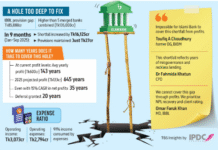Prime Minister Sheikh Hasina has said Bangladesh is moving quickly to patch up the problems plaguing the garment industry in the wake of the deadliest industrial disaster in its history.
In an interview with CNN’s Christiane Amanpour on Thursday, she admitted that there were “some problems” but was quick to add that a committee was looking ways to ensure the safety of buildings and workers.
“This committee will submit the findings to the Cabinet committee and, side by side, we have been trying our best to improve the situation,” Hasina said.
She waved off reports that only 18 inspectors oversee safety conditions in more than 100,000 garment factories in and around Dhaka. “We don’t depend on only … those inspectors.”

Hasina told the CNN’s Chief International Correspondent that measures to improve conditions were taken before the collapse of the building in Rana Plaza in Savar that has killed at least 437 people, most of them garment workers.
She referred to the passage by the Cabinet of a labour law recently and noted that workplace disasters have occurred in the United States, too.
Amanpour pointed out that local officials had predicted that the building could collapse after cracks appeared in the wall the day before the disaster and they had urged workers not to get in it.
Hasina said it was the owners of the factories that put pressure on the workers to enter the building and blamed the owners of the five factories as well as Mohammad Sohel Rana, the building’s owner.
The Prime Minister dismissed the suggestion that their political connections could protect them and added “it is not true that the government hasn’t taken any steps”.
“The law will take its own course,” she said. “Criminal is criminal. They will get all the necessary action; that we can assure you. It is our promise to the people.”
Hasina added, “Any business person, if they commit any kind of crime, our government always takes action.”
She pointed out that workplace disasters have occurred in the United States as well. She cited last month’s explosion at a fertiliser plant in West, Texas, in which 14 people died.
“Anywhere in the world, any accident can take place,” she said. “You cannot predict anything.”
She pointed to the Western companies that source their products from such factories, saying they should pay well enough so that factory owners can pay good salaries and ensure the business is safely run. “They’re partly responsible for it,” she said.
The Prime Minister also urged that the disaster be considered in context. “You cannot blame the whole business or whole industry just for one incident.”
She said officials in her government “are in favour of labour,” having increased the minimum wage by 82 percent, built dormitories and taken care of health care needs of workers.
Hasina expressed little fear that international companies would stop doing business in Bangladesh as a result of the disaster.
Investors have tapped into the Bangladeshi market not just because of its high-quality workers, she said. “They get cheap labour,” she added. “That’s why they come here.”
She, however, denied that the torture and murder of labour leader Aminul Islam last year proved that her government was hostile toward unions.
“Nobody knew that he was a labour leader. It was only after his body was found that we came to know that he was a labour leader and he was assassinated.”
More than a year later, she said, the case remains under investigation.
The interview was carried out via satellite with Amanpour in New York. CNN says it was unable to get visas from the government to send reporters for first-hand coverage.
Source: Bd news24










The Savar building collapse has been so massive, open and well-circulated by the media that it could not be hid from the eyes of the world. But this is actually a tip of the iceberg. Corruption at every level – ‘from top to bottom’ – has brought about immeasurable loss and misery to this wretched nation. Corruption is in fact a congenital disease for Bangladesh and like all other congenital disease, corruption has become an incurable one. Due to the rampant, naked and shameless corruption practiced by everyone involved in the process of either development or purchases, buildings, bridges & culverts collapse, roads & highways sags and become full of potholes, item worth $100 costs $1000, $100 grant/aid/loan shrinks to $25/35 when reaches the target people and so on. And ‘from top to bottom’ everyone has his/her share and that’s the reason why no exemplary punishment can/could be awarded to any offender/criminal. This is our ‘sonar Bangla’; this is our patriotic (?) and popular (?) govts. We are but pawns in hands of a bunch of thugs and bandits who by their wily craftiness win (?) our vote and get down to suck our blood right from the beginning of the day.
Profit-motivated western buyers of Bangla readymade cheapest garments will continue to buy from Bangladesh no matter what happens because for them Bangladesh is the cheapest supplier using slave labour. These buyers visit Bangla garment sweat factory many times a year. They are fully aware of the condition of the factory as well as the workers minimum wage, prevailing inadequate safety. They purchase at the lowest price from the Bangla manufacturers. But they pay only lip-service to human rights, against slave labour, safety and other regulations . Bangla manufacturers do not get market price for their products and that’s why this slave market exists & will continue to exist irrespective of the pious POPE delivering his pious sermon. – Sheikh Shudir Mia Mohasomudra,Dhaka:
It was interesting to see how she coped with the interviewer of the CNN. I wish the opposition leader was also interviewed on the same tragic incident to get her views and to listen to how she would have handled the interviewer. And the people could have drawn a fine line of the Savar Tragedy and assess the 2 women leaders as to their sincerity and commitment to the people and the nation at this time of critical juncture.